Quad-Cities Choir Rehearses Virtually for Next “Messiah” in May
Saturday In The Arts is a weekly look at a personality, place, trend or topic of interest to the Quad-Cities. It runs every Saturday morning on your site for fun, free, local entertainment and features, QuadCities.com.

The composer George Frideric Handel wrote his masterwork oratorio “Messiah” in 24 days in 1741, in 53 movements across three major parts. While long considered a Christmas favorite, it premiered during Lent on April 13, 1742.
A beloved Quad-Cities tradition – performed under the baton of Augustana College music professor Jon Hurty – has been revived in a virtual format now due to Covid-19. The Augustana Oratorio Society, originally named the Handel Oratorio Society, has been rehearsing since early October on Zoom, and the fervent prayer is to sing it with about 150 voices total (including the Augustana Choir and Augustana Choral Artists) on May 2, 2021, as part of the Easter season.
Talk about a musical and societal resurrection.
“I decided it was the safest and best for us to do just online rehearsals,” Hurty – the meticulous, patient director of choral activities at Augie since 1996 — said recently. “It’s a different kind of rehearsal than we would do in person. All the participants can join; I can see all of them on the screen.”
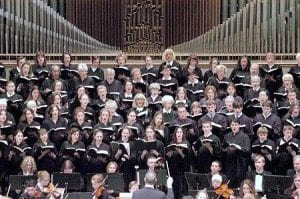
A traditional Oratorio Society performance of Handel’s “Messiah” at Centennial Hall.
Each Monday night, about 50 to 60 singers join in from home and all remain muted, and sing their part along with a recording of the Robert Shaw Chorale with the Atlanta Symphony. Hurty has tried just for fun to see what would happen if he could hear everyone at once. “It’s just a chaotic disaster; it’s incredibly not good,” he said.
He works from his campus office, plays bits on the piano, and he conducts along with the recording. Members can put questions in the Zoom chat. Hurty gives them an assignment for the next week and suggests YouTube videos that play specific parts louder than others along with the chorus.
“We talk about issues they might have in their practice,” he said. “I spend a little more time talking about the structure of ‘Messiah,’ some of the historical background. There are a number of community groups that are functioning like that, where the director talks about the piece, gives a little more information about the piece and a particular movement.”
Though they can’t rehearse all together in person, in that typical setup, there isn’t the time to talk about the piece, Hurty said.
“If we took as much time as we’re taking to do that right now, we wouldn’t get any singing done,” he said. “The one advantage to it is that
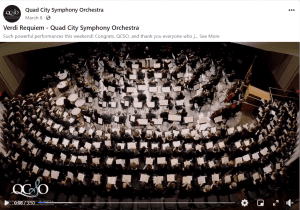
The Oratorio Society performed the Verdi Requiem with the Quad City Symphony in the first weekend of March 2020, before the shutdown.
we’re delving into the piece – Handel’s ideas, how he structured the piece, how he made the music fit the text and all that kind of stuff, in a way we normally wouldn’t do in the in-person rehearsals.”
Normally, they hire professional soloists for a concert, and they just rehearse with everyone a day before the performance. It would be difficult for them to try and put together a 2021 performance with less than a month in-person rehearsing, Hurty said.
“We don’t know what’s going to be happening with the pandemic, how much longer before we have a vaccine,” he said. “If it turns out we don’t have enough time to rehearse before we do a performance, we’ll move that to fall of 2021 or spring of 2022.”
If they don’t do an in-person performance, he’d like to do a virtual performance of excerpts, where everyone would submit a solo recording and he’d blend the voices. That won’t replace a full in-person concert, which would just be held later.
Rehearsing virtually – “People are having to learn to have to self-assess, more than having somebody else assess for them what they’re doing,” Hurty said. “That is the one benefit, I think singers are figuring out through this process – they have to be more confident on their own and they have to think about what they’re doing.”
“They have to become more engaged in the assessment process as a singer and take more responsibility for their own part of the whole,” he
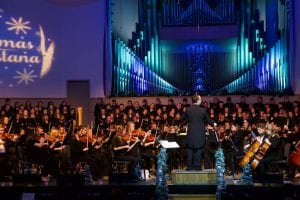
Christmas at Augustana, Centennial Hall, Daniel Chetel. Photo by Leslie Zeglin
said.
In person, a less confident person depends more on singers near them, Hurty said.
“There’s no doubt the in-person aspect of choral music is one of its primary appealing factors for singers,” he said. “You don’t have to be a soloist to sing in a choir. You have to love to sing, and the benefit of working in a community is that you have the ability to be involved in something at a very high level. You’re mixing together with all kinds of people that are involved in the process.”
“That’s the true benefit of in-person choral music that we can’t get when we’re remote like this,” Hurty said. “We have to struggle through the adversity of what we’re doing and when we come out the other side of this, I think people will appreciate, be more engaged in the process, because they realize what they had and what they didn’t have for a while, and now they have it again.”
A choir lifts everyone higher toward a singular goal, and while they can’t have that now, they’re doing what they can.
“What we’re doing in the singing world, we’re trying to be creative, finding ways to sing together, to learn together and build that community – even within the current challenges,” Hurty said. “It will make us look forward more to the day when we’ll be able to sing together in person again.”
Getting a Handel on it
After receiving the text about the prophecy, birth, life, death and resurrection of Jesus Christ penned by Charles Jennens, Handel (1685-1759) began work on “Messiah” Aug. 22, 1741, according to a history of the work. His records show that he had completed Part I in outline by Aug. 28, Part II by Sept. 6 and Part III by Sept. 12, finishing the massive piece Sept. 14.
This fast pace was seen by Jennens not as a sign of ecstatic energy but rather as “careless neglicence,” and the relations between the two men
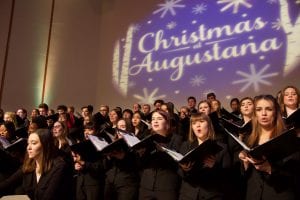
Christmas at Augustana, Centennial Hall, Choir. photo by Leslie Zeglin
would remain strained, since Jennens urged Handel to make improvements while the composer stubbornly refused. The original score’s 259 pages show some signs of haste such as blots, scratchings-out, unfilled bars and other uncorrected errors, but according to the music scholar Richard Luckett, the number of errors is remarkably small in a document of this length.
Twenty years after Augustana College was founded, the Handel Oratorio Society was formed in 1880 by Augustana theology professor Olof Olsson — who saw “Messiah” in London in spring 1879 and wanted to bring the work to Rock Island.
The first Quad-Cities performances were in April 1881, consisting of students and choirs in Moline, Rock Island and Andover, Ill. Their first concert in 1881 was part of the celebration of Holy Week. “Messiah” was done several times in the area that year, according to the college. Often performed around the world in the spring, from 1919 through 2016 it was presented every December at Augustana.
“It was conceived as an Easter piece in the first place,” Hurty has said. “There’s only a slice, from movement 12 to the end of the first part, that’s really Christmas.”
In Part I, the Messiah’s coming and virgin birth are predicted by Old Testament prophets. Part II covers Christ’s death, resurrection and
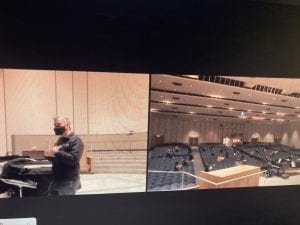
Members of the Augie choir recorded parts from home and their voices were blended for a virtual choir.
ascension, and the first spreading of the Gospel through the world. Part III begins with the promise of redemption, followed by a prediction of the Day of Judgment and resurrection, ending with victory over sin and death, according to a summary.
“Messiah” was built around the idea of Christ’s entire life, Hurty said recently. The first section is the prophecy and the Christmas section. The rest is the Passion and resurrection. Easter Sunday next year is April 4.
“It makes more sense in the big picture to have the performance in the spring, during the Easter season,” Hurty said. “It’s been popular to do at Christmas time because many people love it and it’s become normalized to do it at Christmas time. But the piece itself was really composed with the idea of performance in the Easter season.”
A highlight of the Augie director’s career was in 2011, when the Augustana College Choir and Handel Oratorio Society made their Carnegie Hall debut in New York on May 29, 2011.
The choral groups were invited to perform at the prestigious venue by MidAmerica Productions in New York, the largest independent contractor that presents Carnegie Hall concerts. The Augie choir, which in 2010 sang at Orchestra Hall in Chicago, had to submit a CD of its work before being accepted to perform 30 minutes unaccompanied.

Jon Hurty has been director of choral activities at Augustana since 1996.
Under Hurty’s direction, the choir has performed over the years at Alice Tully Hall in Lincoln Center and Carnegie Hall in New York City, as well as many major cathedrals and concert venues in Sweden, Norway, China, Germany, Italy, Austria, Japan, Korea, Spain and France.
In 2013, Hurty started a new 90-minute version of “Messiah” (mainly the first section), with no intermission, that was performed at Centennial Hall by the 220-voice Handel Oratorio Society, including students. It was billed as the “Christmas Messiah” and done annually (sometimes just 75 minutes) through 2016.
In addition to audience members citing the oratorio’s length (though it’s been trimmed over the years at Augie), a big reason for abridging it was student scheduling, Hurty said. Since the college added the big “Christmas at Augustana” concerts in 2007, that’s added a lot of rehearsal time, he noted.
Hurty later moved “Messiah” back to the spring, a more complete (two and a half hours) version done for Palm Sunday in 2018. So in December 2017, choir director Ron May led a sing-in of “Messiah” at Trinity Episcopal Cathedral, 121 W. 12th St., Davenport.
May for three years presented a 90-minute version of the oratorio on the life of Christ, which served as a community benefit. Inspired by the 1742 premiere of “Messiah” in Dublin, Ireland, all donations the first year were given to Community Health Care of the Quad Cities. The first “Messiah” donated proceeds to the Society for Relieving Prisoners, the Charitable Infirmary and Mercer’s Hospital.
“Some members of our church choir are in the Oratorio Society, and we’re going to miss having ‘Messiah’ sung at Christmastime,” May said in 2017. He’s a 1974 Augustana graduate who previously sang in about a dozen “Messiah” performances.
Last Dec. 6, 2019, the third-annual “Messiah” Sing-In was held at Trinity Episcopal Cathedral (where May is music director) was held, with a free-will collection given to Family Resources.
A Requiem for a historic year
Hurty for years has prepared equally huge choirs for the Quad City Symphony Orchestra, to perform choral masterpieces like the last movement of Beethoven’s Symphony No. 9 and the Verdi Requiem, which was performed with the QCSO the first weekend of March 2020, soon before life was shut down due to Covid.
“It’s one of those pieces of music that just grabs me so viscerally,” Oratorio Society member Jerry Johansen said of that 1874 Requiem. “If you think about the weekend that happened, had it been a week later, it would have been canceled. If you know the text of the Verdi
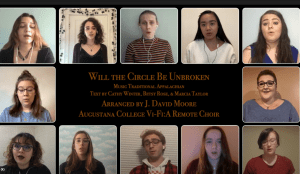
Members of the Augie choir recorded parts from home and their voices were blended for a virtual choir.
Requiem, I thought it was such a dramatic and magnificent statement, going into this whole Covid crisis.”
Johansen – who’s sung in “Messiah” over 20 years – was also to be in the QCSO choir to kick off the fall Masterworks season in October, with Beethoven’s Ninth. This year is the 250th anniversary of the composer’s birth, and that massive piece was shelved for the much slimmer Beethoven First Symphony.
Johansen, of rural Milan, has sung the Beethoven Ninth three times, and didn’t miss as much not doing it again.
“I find it personally fun to watch the orchestra, and be enveloped by the wonderful sounds of the orchestra, but basically you sit there all this time and have five minutes of singing at the end,” he said. “That’s not the most musical thing I’ve ever had to sing.”
“I would much prefer the Verdi Requiem, or the Mozart Requiem,” Johansen said. “Beethoven wrote a great piece of music there, but not a great piece for chorus.”
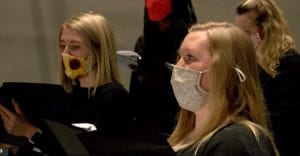
St. Ambrose University singers performed a virtual fall concert Oct. 30.
The pandemic shut down singing (including Augie’s choirs) by the third week of March. Hurty led the Faure Requiem in spring 2019, with professional musicians from the area, including QCSO players.
This past spring, Augustana had to cancel their choir tour out East – the end of March, to Massachusetts, Pennsylvania, New York and Washington, D.C. Everyone was unsure how bad the coronavirus was going to be and how long it was to last, Hurty said.
From then on, they did virtual rehearsals, getting together and more talking about what to do for this year. “We were almost ready for our tour program,” he said. “That music, we never actually performed that music.”
The 2019 choir tour was in the Midwest, Hurty said.
This fall, the Oratorio Society meets on Zoom Monday nights for 90 minutes, and the Augie Choir, Concert Chorale and Jenny Lind Vocal Ensemble (which is all women), all rehearse in person three times a week. Illinois allows no more than 50 people gathering at once, and each group is less than 50.
The choir meets in Centennial Hall four times a week, spread out 10 to 12 feet apart, standing in the audience seats, wearing masks. They have 30 minutes singing, and 15 minutes out of the room, and 30 minutes back. Jenny Lind (about 40 students) rehearses in Wallenberg Hall, and choirs also use Ascension Chapel.

An example of the singer’s mask, which gives more room to breathe.
Hurty said there will be no in-person performances this semester, and it’s unsure for next semester. If things change, it’s possible they could do in-person in the spring.
They are livestreaming some rehearsals on the choir’s Facebook page, and they’re doing video recordings of pieces, presenting them in a variety of ways.
Because they won’t do a traditional Christmas at Augustana this season at Centennial, they will release an “advent calendar” of videos in December, with a different performance released each day, until Christmas. About half of the 24 days will be newly recorded and the rest will be highlights from Christmas at Augustana of the past two years.
“It’s going to be a really fun thing to do,” Hurty said. “I think it’s gonna be fun because it’s the kind of thing people can see them on YouTube, and instead of opening a window, you open a video for that day’s performance. We’re excited about that format. Of course, it’d be better to be in person, but we’re excited about having something interesting to present in December.”
Some of the recording will be from the chapel, plus St. Paul Lutheran Church in Davenport, and some in Centennial – all wearing special singer’s masks. Augie got a generous anonymous donation to buy the singer’s masks for all choirs. Those masks just out to give everyone more room to project.
“Everyone looks like they have little duck’s bills,” Hurty said. “It’s much easier to breathe, and there’s actually room inside of it so the sound is not quite as muffled.”
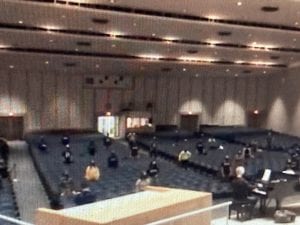
Choir members practice while wearing masks, spread out at Centennial Hall..
“It’s better than I thought it would be, singing with masks on. The biggest problem and something that’s impossible to completely overcome is the consonant issue, which is quite fascinating. The tone color is about the same as it is without a mask, but you can tell it’s slightly muffled in terms of the consonants.”
“I suspect when this is all over with and we can get back together without masks on, we’ll be better singers because we’ve had to become more independent,” he said. “They’ve had to become more confident and independent as singers. That’s one of the few benefits of this – that skills improve through the difficulties we’ve had to endure.”
St. Paul’s choir is also singing in person, with social distancing and masked, on recorded videos for services.
Oratorio members make adjustments
Steve Arp of Davenport first started with “Messiah” 15 years ago and has been in the First Presbyterian Church Sanctuary Choir (which has 60 regular members) since he graduated from the University of Iowa in 1973.
Arp was a charter member of Quad City Choral Arts, which changed its name to Augustana Choral Artists two years ago, when Handel Oratorio Society switched to Augustana Oratorio Society. Choral Artists is a 16-member community group including choir alumni and area
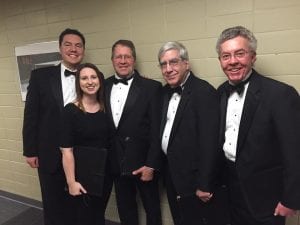
Steve Arp, right, with members of the First Presbyterian Sanctuary Choir.
teachers.
Arp sang in all the Holiday Pops concerts with the Quad City Symphony at the Moline arena (now the TaxSlayer Center), and many big choral works with the Symphony at the Adler Theatre and Centennial Hall.
“The Mahler Second, which we don’t sing ‘til the very end, is a very special piece for me,” he said of the 1895 “Resurrection” Symphony. “I was fortunate enough to sing in the opening concert for the original Hancher Auditorium in Iowa City (1972), when we did the Mahler Second, and when the brand-new Hancher opened (2016), I was part of a handful of singers that had sung in both performances, at both venues. It’s a very special piece for me.”
First Presbyterian has not returned to in-person services yet, except some limited outdoor worship, Arp said. The choir director wanted to do some singing, and they have rehearsed at LeClaire Park (with masks), about 40 singers spread out in the fixed seats. “It’s better than nothing,” he said.
“It was great. It’s hard to hear where we were seated,” Arp said. “But it made you concentrate more as a singer, listening to yourself and blending. I feel choral music is 90 percent listening to each other. The singing comes as a result from that.”
Leading church worship is very important, and singing with the symphony and Oratorio Society are also very satisfying, he said.
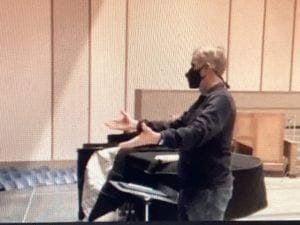
Hurty leading rehearsal from the Centennial stage.
“The virtual rehearsals have been very different,” Arp said of “Messiah.” “Jon has really done his homework and done a great job, especially in the first couple rehearsals, really giving us a lot of background about Handel and how this marvelous piece came into existence – a lot of history I didn’t know about. So that was very good to kick off these virtual rehearsals.”
“When you get everyone together in a live rehearsal, the meter’s running and you want to get in as much singing as possible,” he said. “Virtually now, we’ve sung through choruses, and he has the soundtrack going, and he is directing on the Zoom set-up.”
But singers can’t hear anyone else sing, and Arp thinks that’s an advantage for the virtual process.
“You’re listening to yourself and you know right away the sections you’re having trouble with,” he said. “He’s also working a lot on reviewing for new singers, for when cutoffs are, when breath marks are in the score.”
Arp last sang the abridged “Messiah” in the December 2016 season, but not the full one in May 2018.
He thinks doing a more complete “Messiah” makes it more meaningful around Easter, since that’s when it originally started at Augustana. Arp loves being in choirs since it’s been a part of his life for decades, since grade school.
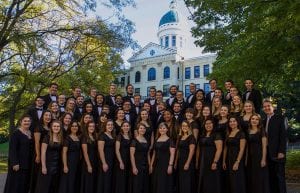
The Augustana Choir, in pre-pandemic days, in front of Old Main on the Rock Island campus.
“Dr. Hurty’s pursuit of excellence is really important to me,” said Johansen, who also was in Verdi Requiem. “I’ve been in other Messiahs, like in Chicago, where they have a do-it-yourself Messiah. You sit there with a good orchestra, and the whole auditorium is full of people singing; it’s nice, but it’s not really very accurate. Dr. Hurty always pursues excellence so much.”
“Virtual is better than nothing at all, but you don’t get to hear the people around you,” Johansen said. “Virtually is not the same, but on the other hand, the very fact that Dr. Hurty is trying to make all this happen, even under difficult circumstances, it’s better to do this than nothing at all.”
His church in Rock Island also does a virtual service, and Johansen and his wife attend a Zoom service with their daughter in St. Louis. “I don’t know when we are going to go back, since a large number of our church are in their 70s or older,” he said.
The in-person schedule for “Messiah” is all Covid-dependent. “I am just thrilled he’s putting this together,” Johansen said of Hurty.
Jennifer Cook Gregory of DeWitt is one of the few not singing solo from home. She’s part of “Messiah” with her husband, Robert.
“It is very different and very unusual,” she said recently, noting she first did “Messiah” in the late ‘90s — not every year since then, but about a dozen times altogether.
“It’s really interesting – when we’re having usual in-person rehearsals, we’re just focusing on the music, perfecting that aspect,” Gregory said. “It’s been fascinating hearing all the information of the history of the piece, like Handel’s life, and the origin of just the piece in general. One week, it was very interesting, he played samples from Handel’s other works.
“He had sort of taken things he had written, repurposed it and gave the song a different name,” she said. “It was not like an all brand-new piece he created, but like putting new paint on it and selling it at the dealership.”
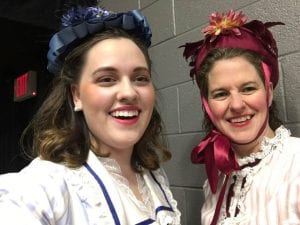
Jennifer Cook Gregory (right) and Emma Tully with Opera Quad Cities’ “Pirates of Penzance” in June 2019.
In the past few years, Gregory has sung in the QCSO choir when they did a Debussy piece and they were in the middle of the orchestra on stage. “It was like fantastic,” she said. She sang in the chorus for Opera Quad Cities’ “Pirates of Penzance” at St. Ambrose and a choir for “Harry Potter and the Prisoner of Azkaban” with QCSO at the Adler Theatre.
“I had not seen a movie with orchestra. It was kind of fascinating seeing how that whole thing worked,” Gregory said. “With that particular music, it’s probably the most difficult thing I’ve ever done in a performance.”
This past spring, she also was supposed to perform “Guys and Dolls” at First Presbyterian in Davenport, canceled due to lockdown. Gregory was to play Sarah Brown, one of the leads, and started rehearsing in early January.
With “Messiah” – “It’s always just so powerful, even though, I’m not a big religious person. You hear the story, you feel like the presence of God there. It’s very powerful.”
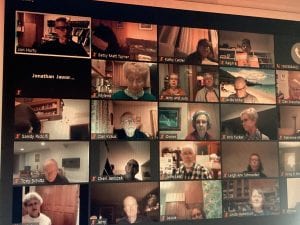
A recent Zoom rehearsal of “Messiah” by the Augustana Oratorio Society.
“It’s hard not singing with other people,” she said. “Since my husband and I both are singing, if he and I are rehearsing together, I hear the tenor part when we’re singing.”
“I can hear the interplay between the two parts, that’s interesting.”
“I miss choir so much”
Kris Tucker of Bettendorf is a longtime choir member at Zion Lutheran Church in Davenport (which hasn’t had an indoor service since mid-March) and 20-year QCSO subscriber. She’s sung in “Messiah” just once before, in 2016, and leapt at the chance to try it again, even just virtually.
“I feel like I’m part of a larger group, but at the same time I’m on my own,” Tucker said recently. “Not being surrounded by my fellow altos, I’m finding I have to know the music really well. There’s no fudging anything. It is really challenging. But there are benefits to that.
“I am so happy to have a reason to sing just because I want to,” she said. “We might not sing this together for a very long time. On the other hand, when we do, I’ll really know it well. I really miss having folks to lean on.”
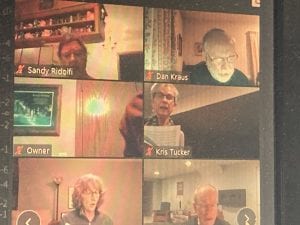
A recent Zoom rehearsal of “Messiah.”
Compared to the intense, in-person rehearsals with over 100 for “Messiah” at Centennial, this brave new world is much more relaxed, Tucker said.
“I don’t have to rush over to Augie; I can just go down to my basement,” she said. “Jon is sharing a lot of background and it’s fascinating. I had no idea that it was originally done for charity.”
Though singers can’t hear each other, “It’s nice to see other people’s faces,” Tucker said of Zoom. “Especially in this place and time, we all feel so isolated. The great joy for me is to have a reason to sing again. I sing around the house, but who cares?
“I miss choir so much,” she said of her church, noting she and her fiancé have done some recording of songs for Zion’s online services. “I keep thinking we should be in the midst of preparing for the holidays; it’s just so hard.”
The Augustana Choral Artists recorded a couple pieces this fall with masks on, outside in Moline’s Prospect Park. They may do more virtual performances in the spring, Hurty said.

Kris Tucker with David Hansen in 2018.
A student’s perspective
The Augie Choir is meeting in person to rehearse, with singer’s masks, and some members have recorded pieces from home with Hurty mixing the sound and videos. One example can be seen HERE.
Jonathan Jaworowski, sophomore member of the Augustana Choir, is a vocal music education and theatre arts major, and helps Hurty with a lot of the tech aspects of rehearsal and performance. He is the music department’s social media coordinator and Augie’s music librarian.
“If I was to say that choir was the same as it usually is, would be a complete lie,” Jaworowski said recently. “While it is amazing that there is an opportunity for the Augustana Choir to be able to sing in person, there are some other challenges that come with this. Augustana has done an amazing job at enforcing policies to keep us all safe, and our outstanding music faculty have made music as safe as possible during these times.
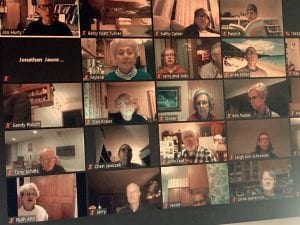
The singers are hoping to do the oratorio in person May 2, 2021.
“During choir, we are all spread out 12 feet away from one another, wearing masks, and rehearse for 30 minutes, then allow a 15-minute air-break before resuming another 30 minutes of rehearsal,” he said. “While we can sing together, the 12-foot distance and masks make it challenging for us to hear one another and all keep our tempos together. The perk of this is that each person is held more reliable for knowing their part, which helps the choir as a while in the long run.
“With all of the safety measures in effect, there are still times where we wonder ‘what could happen?’” Jaworowski said. “With contact tracing being very important to the health of the student body, we sometimes have peaks where we are missing a portion of our ensemble members because they are sequestered or quarantined — this can make it hard for us to schedule recording dates because we never know when someone can be sequestered.
“In the end, the choir is extremely difficult for individuals given the circumstances, but we are very fortunate to be able to sing together again,” he said.
For Oratorio Society, Jaworowski serves as Hurty’s assistant.
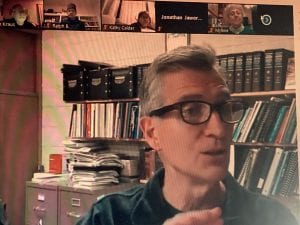
Jon Hurty gives instructions from his office over Zoom.
“I often help our members with tech elements of getting into our Zoom rehearsals. With many of our community members not having much exposure to Zoom, it can be difficult for some of them to understand how the technology works and how to use it properly,” the student said. “That being said, all of the members have been extremely adaptable to the situation and it is very rewarding knowing that so many of the community members still want to sing ‘Messiah’ this academic year.
“That being said, we don’t know what the future may hold so Dr. Hurty is constantly coming up with plans on how we could do a virtual Messiah performance if we are not able to do one in-person,” Jaworowski said. “In the end, both groups have been extremely adaptable and understanding of what has to happen for us to sing together safely and that is all that I could ask for.”
During a recent Augie choir rehearsal, streamed live on Facebook, many alumni posted their passionate support.
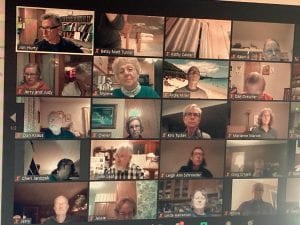
The Oratorio Society members are all muted during practice and can’t hear each other.
“This is a wonderful idea,” wrote Suzanne Dell-St. Clair, class of 1982. “Thank you for inviting Augustana Choir alumni in for a rehearsal. It brings back great memories.”
“There are many alumni who are thinking of you,” said Kathy Janicek, class of 1974. “It’s great to see how you are adapting! What a challenge!”
In early November, St. Ambrose University’s Music Department posted a video of its fall 2020 (virtual) Vocal Concert, held Oct. 30 featuring the masked SAU Chamber Singers, Bella Voce, and University Chorale, performing without an audience.
“While things are different this year, one thing that has not changed is our need to sing and share musical moments together, in-person,” the Davenport school posted on Facebook. “We are grateful to have done that, without compromising student safety and health. Singing is not canceled!”
The Augustana Oratorio Society is working toward its May 2 goal in person, but singers are realistic that a full concert may be postponed again.
“I really kind of feel like something like this is not likely to happen, until a vaccine that’s widely available,” Gregory said.









